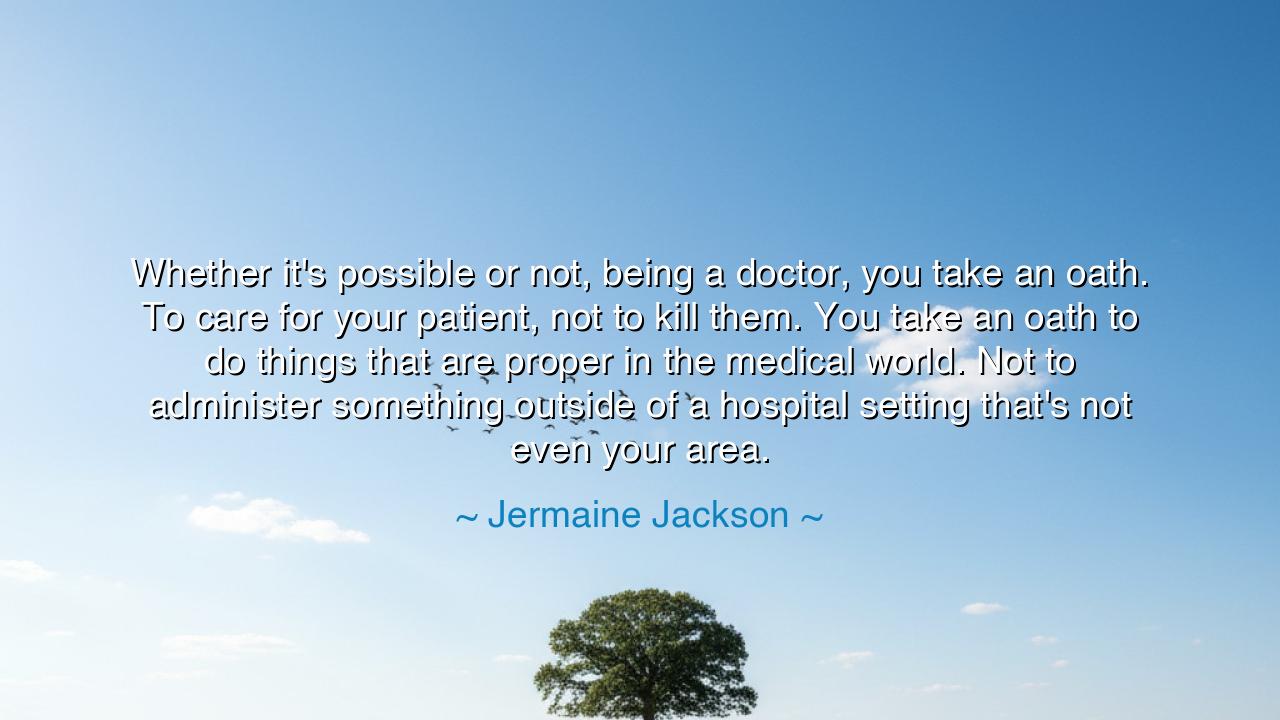
Whether it's possible or not, being a doctor, you take an oath.
Whether it's possible or not, being a doctor, you take an oath. To care for your patient, not to kill them. You take an oath to do things that are proper in the medical world. Not to administer something outside of a hospital setting that's not even your area.






In the words of Jermaine Jackson, brother, artist, and witness to tragedy, there resounds a moral truth as ancient as civilization itself: “Whether it's possible or not, being a doctor, you take an oath. To care for your patient, not to kill them. You take an oath to do things that are proper in the medical world. Not to administer something outside of a hospital setting that's not even your area.” His voice, trembling with grief yet rooted in conviction, is not merely a criticism — it is a lament for the betrayal of duty, the breaking of sacred trust. His words echo through the corridors of both medicine and morality, calling all who serve life to remember the sanctity of their purpose.
The origin of this quote lies in the aftermath of the tragic death of Michael Jackson, Jermaine’s younger brother — a man loved by millions, but also one who suffered deeply. In the days and years that followed, Jermaine spoke often of the pain of losing his brother and the responsibility of those who had sworn to protect him. His words here refer to the Hippocratic Oath, the ancient vow taken by all physicians: to preserve life, to do no harm, to act with integrity and compassion. It was not merely a code of conduct, but a covenant between healer and humanity. When Jermaine spoke of that oath being broken, he was not only mourning his brother — he was mourning the corruption of a sacred promise.
The Hippocratic Oath, born in the time of the ancients, was not written for an age of machines and medicine, but for the eternal human struggle between power and ethics. Its heart has remained unchanged for over two millennia: “I will apply dietetic measures for the benefit of the sick according to my ability and judgment; I will keep them from harm and injustice.” To be a doctor, the oath declares, is to stand between life and death, using knowledge as a shield, not a weapon. When Jermaine reminds us, “You take an oath to care for your patient, not to kill them,” he is invoking that timeless law — that those who are given power over the body must also carry reverence for the soul.
There is a story from the ancient world that mirrors this truth. Asclepius, the Greek god of medicine, was once so skilled that he learned to raise the dead. But his gift, once divine, became dangerous. When he accepted gold to use his powers for the wealthy and corrupt, Zeus struck him down with lightning, for even healing, when divorced from ethics, becomes destruction. The myth teaches what Jermaine’s words remind us today — that to wield the gift of healing without humility is to invite ruin. For knowledge without conscience is like fire without control: it warms the good but consumes the careless.
When Jermaine Jackson speaks of doctors “administering something outside of a hospital setting,” his grief turns to warning. He speaks of boundaries, of respecting the limits of one’s knowledge and the sanctity of procedure. Medicine, he reminds us, is not a realm of experimentation upon the living soul. It is not a place for pride or recklessness. The doctor’s art must be guided by humility — by the awareness that even the most skilled hands must bow to the principles of discipline and caution. For when ego replaces ethics, when convenience replaces care, tragedy follows as surely as night follows day.
Yet, beneath his anger lies something greater — a reverence for life itself. To Jermaine, the doctor’s oath is more than a rule; it is a reflection of humanity’s oldest instinct — the will to protect one another. His words are not spoken only for physicians, but for all who hold responsibility over others: teachers, leaders, guardians, creators. Whatever our calling, we too take unseen oaths — to act with integrity, to protect what is entrusted to us, to never misuse the power we are given. The message is universal: with great trust comes great duty, and to break that duty is to betray both one’s profession and one’s soul.
So, my children, take this wisdom into your hearts: honor your oaths. Whatever path you walk — whether healer, teacher, or builder — remember that your skill is sacred only when guided by conscience. Do not let pride cloud your purpose. Do not let profit outweigh compassion. For every talent you possess is a covenant with the world, a promise to serve, not to harm. Let your hands, your words, and your choices become instruments of care, not chaos.
And remember the sorrow that gave rise to Jermaine Jackson’s words — for even grief can be a teacher. Out of pain, let us learn to guard what is holy. Out of failure, let us vow to act rightly. For the true healer, in medicine or in life, is not the one who holds power over life and death, but the one who understands that every life, every soul, is sacred — and that to care, always, is the highest form of honor.






AAdministratorAdministrator
Welcome, honored guests. Please leave a comment, we will respond soon